Victoria Handford, Thompson Rivers University, Kamloops, Canada
Joe Dobson, Thompson Rivers University, Kamloops, Canada
Yuhang Liu, Thompson Rivers University, Kamloops, Canada
Handford, V., Dobson, J., & Liu, Y. (2021). Student, faculty, and graduate teaching assistant perceptions of support provided by a graduate student writing centre. Studies in Self-Access Learning Journal, 12(2), 148–176. https://doi.org/10.37237/120203
Abstract
The purpose of this mixed-methods study was to identify key factors in a discipline-specific, self-access graduate writing centre that both contribute to student success and that indicate needed improvements. The centre is located in a graduate education program at a university in Canada. Findings indicate the centre contributes to student success most directly by helping students improve their writing, which leads to an overall sense of confidence and engagement. Relationships with other students were also enhanced and found to be important. Faculty similarly noted that the improvements in writing and the strengthening of the graduate student culture were important gains. Graduate teaching assistants working in the centre said they benefited from improvements with their writing, which they linked to supporting students, as well as personal gains in their instructional skills. Suggested improvements included increasing appointment availability, adding workshops on new topics, increasing the availability of workshops and events, and increasing interaction between students and faculty at social events. These results indicate that providing targeted supports led by students but guided by faculty input and oversight can increase graduate student success and benefit graduate programs in general.
Keywords: graduate student success, graduate culture, self-access centre, writing centre, international students
While university writing centres are often pan-campus and support both undergraduate and graduate students, some are discipline-specific centres for graduate students (Phillips, 2013). At a university in Canada, a self-access graduate writing centre housed in graduate programs in education was established to support students in the Master of Education and the graduate certificate programs. Fuelled by growth in international students, enrolment in the programs increased more than three-fold in five years to approximately 350 full- and part-time domestic and international students in face-to-face, blended, and online distance environments. Faculty increasingly found that many students, especially international students, struggled to adapt to the writing and scholarly discourse expected of them in graduate studies. The faculty also felt a social responsibility to create opportunities for students to develop their ability to do quality work, gain confidence, and feel connected. To work toward addressing these challenges, faculty advocated that a faculty-specific graduate writing centre be established. In 2018, funding was allocated to open the graduate writing centre.
Each semester, the centre employs three to five graduate teaching assistants (GTAs). The GTAs, senior students in the program, provide tutorial support, deliver workshops, and organise events. Appointments are offered in 45-minute blocks. Demand for support grew from 225 appointments the first semester it was open to approximately 425 appointments in subsequent semesters. The GTAs work collaboratively with students using a participatory and relationship-based approach. They also work closely with faculty to understand assignments and rubrics. When helpful in explaining an aspect or detail, they may explain in the tutee’s first language, an aspect worthy of consideration. The GTAs also work to foster a sense of community for students through events and the understanding of individual needs.
This article presents the findings of a study which examined how a graduate writing centre was meeting the needs of students, faculty, and the program. It also identified possible improvements to the centre. One goal was to understand the key factors that contribute to students improving their skills in graduate-level academic writing. Another goal was to identify if and how the centre contributes to a positive academic and social environment.
Literature Review
The number of international students has increased significantly in Canada in recent years (Anderson, 2015). This has raised questions about the support that is needed to help these culturally and linguistically diverse students be successful. Barriers to academic success for international graduate students are distinct from those of their domestic counterparts. One factor may be a decline in admissions standards at some institutions, which has led to the admission of some students whose writing skills do not yet meet the demands of university-level study (Harwood et al., 2009; Lines, 2016; Starfield, 2016). Okuda and Anderson (2018) note that international students “may lack experience with the expected disciplinary genres and who have underdeveloped English language academic and social support networks” (p. 392).
The transition to being “professional scholars” (Vorhies, 2015, p. 6) is challenging for many graduate students. Yet, as Forbes et al. (2007) note, due to an assumption that they require less support, many universities provide less support for graduate students compared to their undergraduate counterparts. Graduate writing centres may help as they “can position themselves as safe spaces for graduate students to build expertise and rehearse their roles as experts” (Summers, 2016, p. 117). Tutors in university-wide writing centres, particularly at the graduate level, may not have the same discipline-specific background that the student they are tutoring requires (Leverenz, 2001). Tutors in the same program can guide students in understanding course content, assignment details, and evaluation criteria (Rollins & Lillivis, 2018).
While there is a rich body of literature on writing centres, there has been less research on writing support for international graduate students (Phillips, 2013). After completing English language coursework, some non-native speakers of English (NNSE) students struggle when they enter content classrooms (Kim, 2006). International graduate students may benefit from specific language support. In a study of NNSE in graduate studies, Cheng et al. (2004) found that most students perceived writing as the most difficult and needed writing support after admission. International students also struggle with writing conventions, citations, and textual borrowing (Shi, 2004). Furthermore, some face allegations of plagiarism due to failure to properly cite sources (Denchuk, 2020).
Writing centres maintain the locus-of-control with the students themselves, something essential for adult learning. Although students go to writing centres for support, “they do not literally mean they want someone to look at the paper and that is all” (Rafoth, 2010, p. 147). Students want to talk about what they have written, ask questions, and see the tutor’s reaction (Rafoth, 2010). The relationship between NNSE graduate students’ perceived language challenges and their academic performance was explored by Berman and Cheng (2001) who found language challenges negatively impacted academic achievement. Writing centres may help students improve their grades; Schendel and Macauley (2012) found that after visiting a writing centre several times, students’ GPA increased. However, there is a lack of consensus on language proficiency as a predictor of academic success (Bers, 1994; Martirosyan et al., 2015; Vinke & Jochems, 1993).
Adapting to life and study in a new cultural and linguistic context is a challenge for many international students (Girmay et al., 2019; Liu, 2011; Moussu & David, 2015; Nakamura, 2010). For international students, challenges to adapting to study in a new academic culture include stress management, a lack of social connections, financial stress, and language barriers (Chen et al., 2015). Spurling (2007) notes that international graduate students, who face those varied struggles, are often viewed as “subject learners” (p. 114). For international graduate students, academic success is important, but so too is social-cultural adjustment (Cheng et al. 2004; Myles & Cheng, 2003). Many international students feel a sense of isolation and a lack of belonging; Hanassab (2006) found this was highest among Asian, Middle Eastern, and African students. University programs and services offer varied ways for students, both domestic and international, to connect with others on campus. For example, writing centres play an important role in providing opportunities for social integration, such as at events (Wolcott, 1987); however, additional support is needed to help international students adapt to study in a new academic context (Denchuk, 2020). Writing centres can provide various opportunities for all students to be successful at the graduate level and be connected to a learning community.
Methods/Methodology
Methods
Mixed methodology was used to investigate the perspectives and experiences of students, GTAs, and faculty in relation to the graduate writing centre. A student survey was distributed, student interviews and interviews with graduate teaching assistants were held, and a faculty focus group was conducted. Institutional research ethics approval was obtained before beginning data collection.
Three main questions the research sought to answer were:
- What factors benefit students most in relation to their involvement in the graduate student success centre and their academic work?
- What factors contribute most to creating a positive academic and social environment at the graduate writing centre?
- Which elements in the centre could be adjusted or improved?
Student Survey
The survey included six demographic questions and 23 items that each potentially assessed a separate factor related to the graduate student experience.
The student survey was made available through the graduate centre’s Moodle site. All students enrolled were invited to participate in the survey, and two reminders were sent. The GTAs reminded students visiting the centre that the survey was available for them to complete.
The quantitative questions addressed the following issues:
- What key factors related to the university experience of students enrolled in graduate programs in education do they identify as important?
- Do the identified key factors predict academic achievement?
- Do the identified key factors predict accessing the graduate centre?
- What will graduate students report as the reason they accessed the graduate centre?
Interviews
All students in the programs were invited twice to participate in 20–30-minute interviews. Thirty-five students volunteered to be interviewed. However, the onset of COVID-19 necessitated reducing the number of student interviews. A convenient and representative sample of five students (four female and one male), all international students, was identified. All had visited the centre ten or more times for support. Questions can be found in the appendices. Questions invited interviewees to offer perspectives on aspects of the success centre such as how they benefited from engagement with the centre.
Five GTAs, three female and two male, were interviewed by a research assistant not associated with the centre. Four of the GTAs were international students, and one was a domestic student. Both sets of interviews were recorded.
Focus Groups
A focus group was held with faculty for about 75 minutes with eight faculty participating. Discussion questions were distributed ahead of time, enabling faculty to consider issues with students and/or each other before the meeting. Notes were taken by two research assistants. The notes were distributed to the faculty who participated. Faculty were invited to add additional thoughts or emphasis, and/or to adjust the wording of statements and return the adjusted notes to the research assistants who then incorporated the additions, deletions, or adjustments, and finalized the notes.
Data Analysis
An exploratory factor analysis (EFA) of the survey results was completed. Because the survey asked students how often they accessed the centre, an analysis could be done to identify which key factors would predict student access. Fixed regression was used with the key items serving as predictors and graduate centre access as the outcome. To better understand the relationship between the motivations, tetrachoric correlations between the various motivations were conducted. Students were asked for their average grade in the program, which allowed a regression analysis to identify which key factors would predict academic achievement. Separate analyses were conducted for gender and country. For gender, separate analysis of variances (ANOVAs) were conducted for each key factor. Separate one-way ANOVAs were conducted on each of the six key factors to examine differences among different countries.
Findings
Survey results
A total of 128 students in face-to-face courses (75% response rate) and seven students enrolled in online distance courses (4% response rate) completed the survey. Of these, 107 (79%) were females and were 27 (20%) males.
Key Factors of the Graduate Student Experience
As seen in Table 1, the EFA identified key experiences clustered into two groups, namely graduate centre and relationships. Of the six key factors identified, two were rated very positively: relationships with the GTAs and support services provided by the graduate centre. The relationships with faculty and with other students were also rated very positively. Writing skills nearly approached significance in the EFA (.47), but being consistent with the criterion of .50, it was not included in further analyses. Grades and writing skills were not identified as key factors.
Table 1
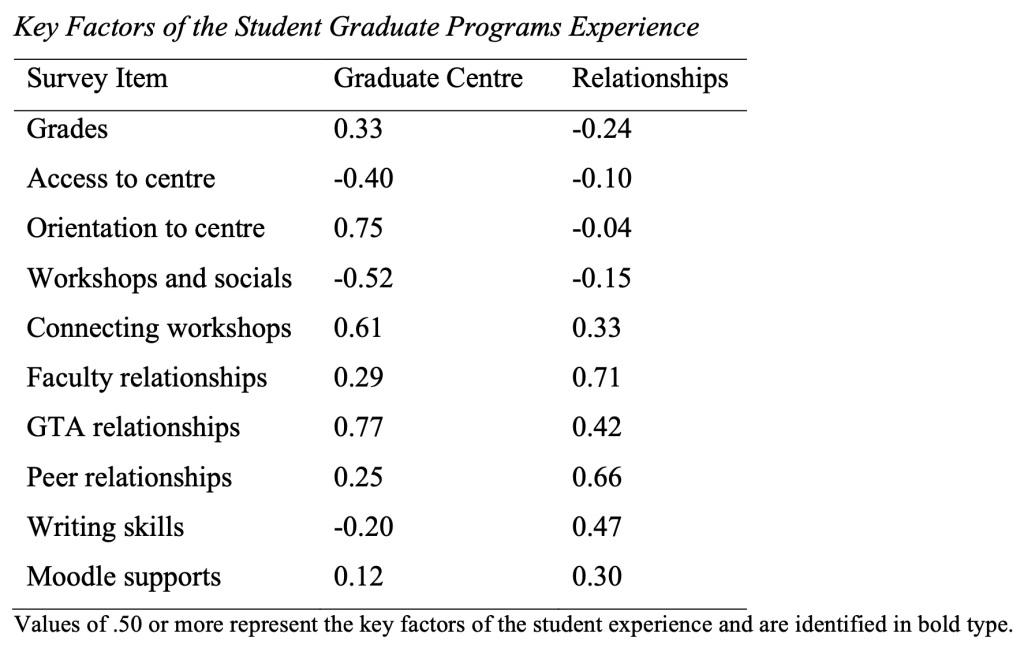
Key Factors That May Have Contributed to Accessing the Graduate Center
As Table 2 illustrates, the only factor that predicted if students would access the centre was their relationship with a teaching assistant. Significantly more international students accessed the centre than did domestic students. A statistically significant relationship was observed between domestic and international students in accessing the graduate centre (x2 = 26.67; p = < 0.001; df = 1).
Table 2
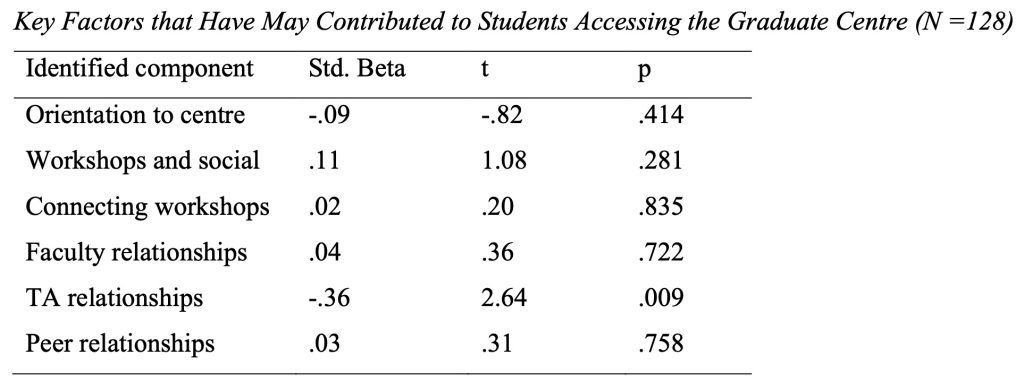
Key Factors that May Have Contributed to Academic Achievement
As Table 3 shows, faculty relationships with students and orientation to the graduate centre were the only key items that predicted academic achievement.
Table 3
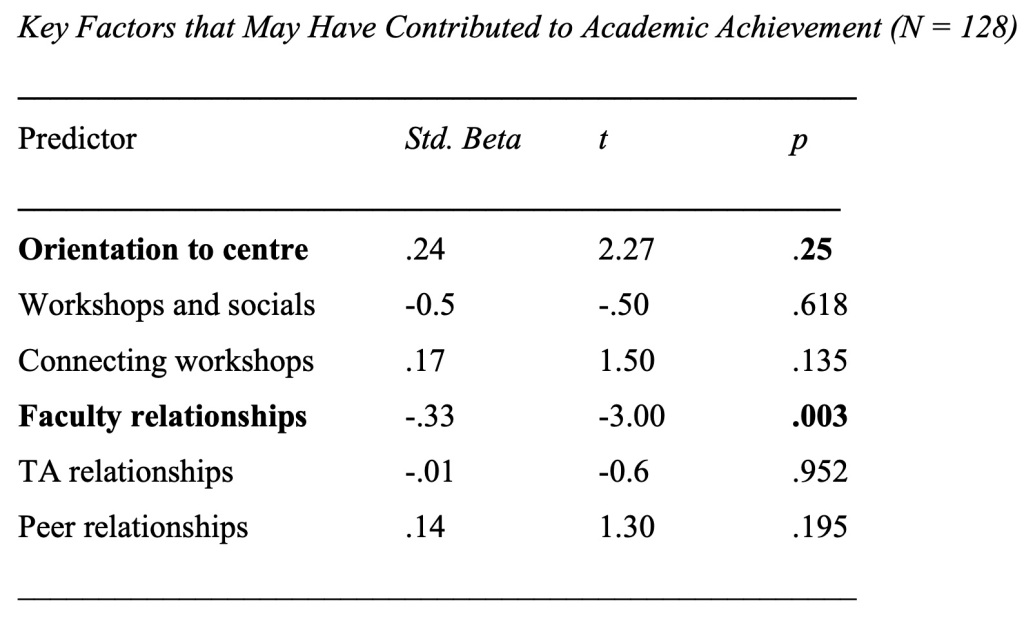
Differences of Key Factors by Country and Gender
The results showed no significant differences across gender (all ps > .05). The only significant difference between students from Canada, India, and China was the orientation to the centre, with the students from Canada finding the orientation less helpful than did those from India and China (F (2) = 5.71, p = .005).
Reasons for Accessing the Graduate Centre
As Figure 1 shows, the top two reasons for students to access the centre were directly related to writing, including APA, grammar, thesis statements, and literature reviews.
Figure 1
Motivation for Accessing the Graduate Centre
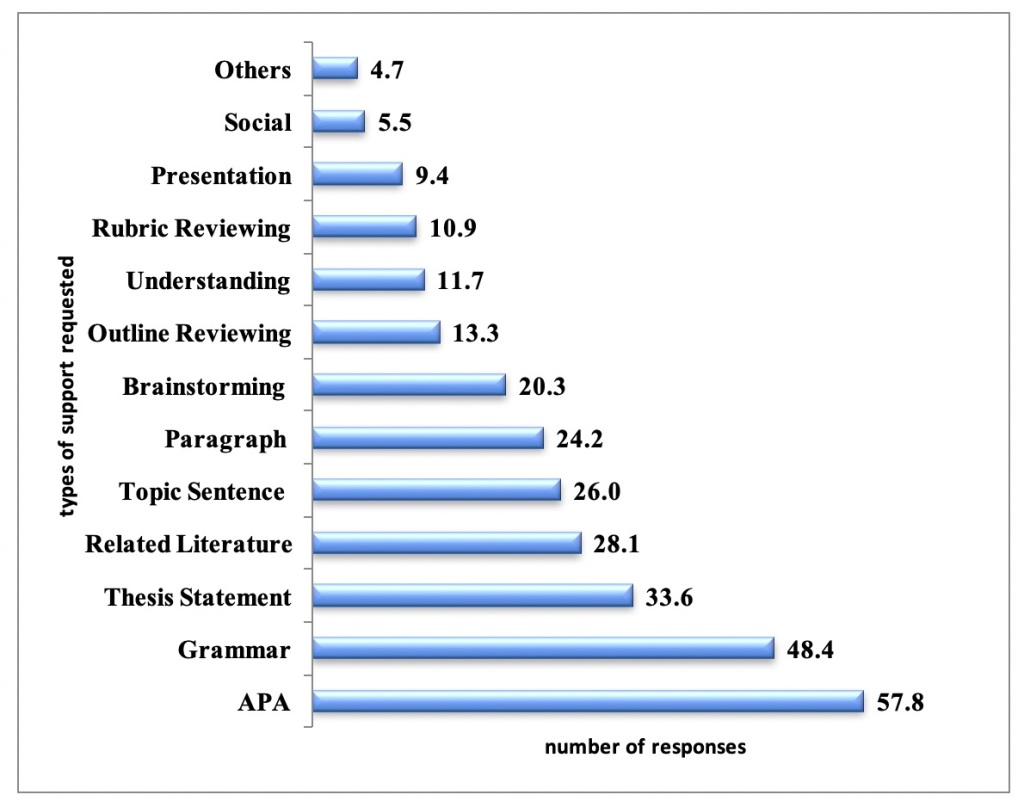
Students commonly identified more than one reason for accessing the centre. As Figure 2 indicates, except for presentations and social motives, the students’ reasons for accessing the centre correlated with each other.
Figure 2
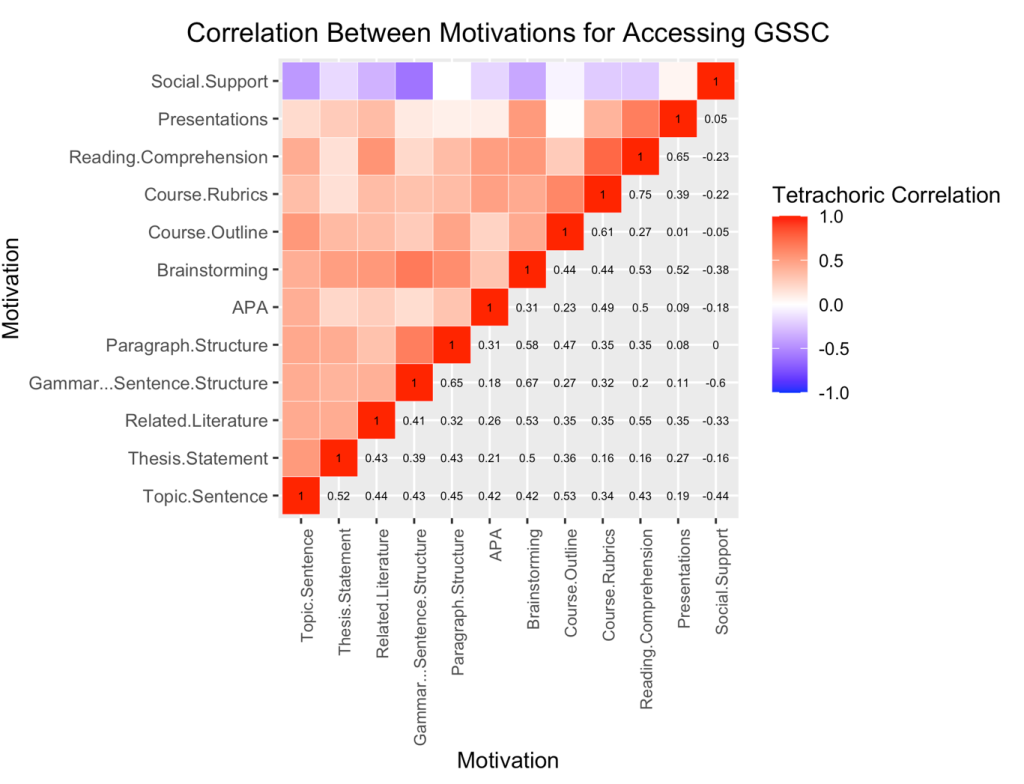
As the exploratory factor analysis findings in Table 4 show, help with APA was not identified as a key factor for accessing the centre, although the .46 loading of APA support in Factor 1 approaches the threshold of significance of 0.5. However, APA was listed by the highest proportion of students in Figure 1 as a reason for accessing the centre.
Table 4
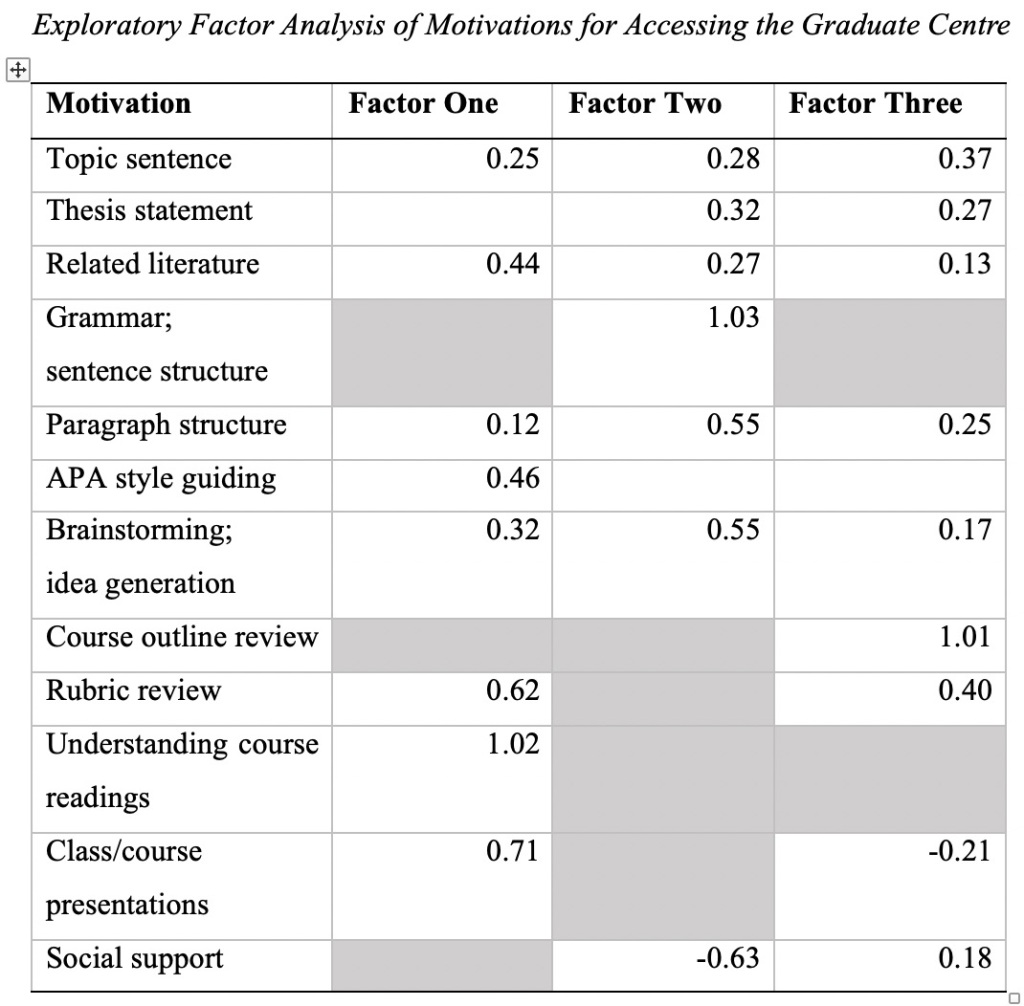
Figure 3 illustrates the two key factors related to the university experience of the students. The two key factors were related to the centre on the left and relationships with faculty and peers on the right. The graduate centre factor included relationships with the teaching assistant, supports, and workshops.
Figure 3
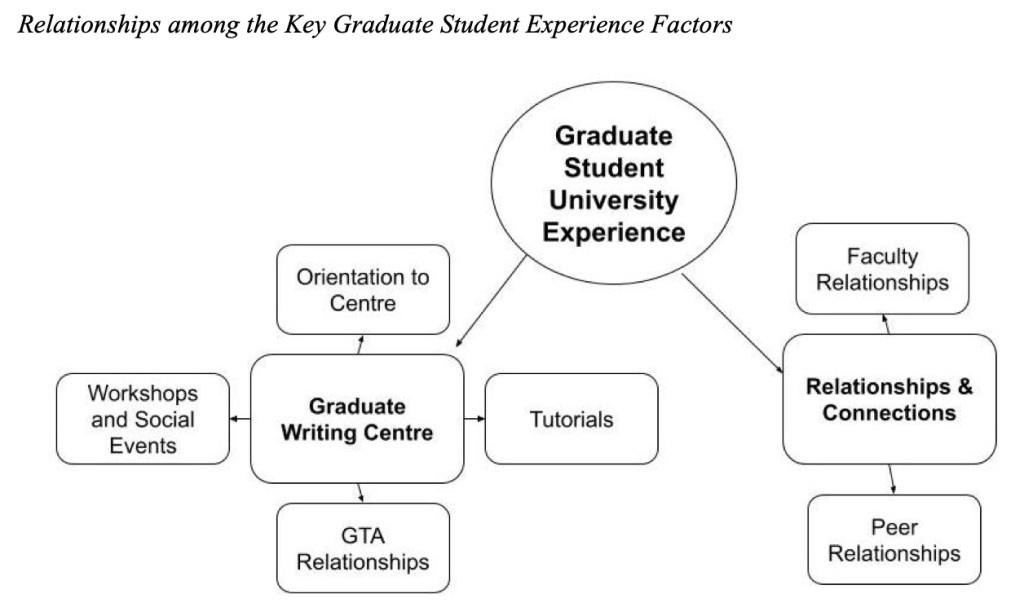
Qualitative Findings
Benefits: Improvements in Academic Work
In the interviews and focus groups, the students, GTAs, and faculty identified improvements in writing as a benefit of the centre. Each student interviewed named improvements in grammar, APA formatting, and sentence structure as benefits. These are all essential technical skills required for graduate writing. These students connected these gains to confidence in their competence. One student commented:
It helps me a lot especially in the APA format, because once I just landed over here, I didn’t know anything what is the exact meaning of the APA format, even in the classroom we just ask about it but still it is confusing for us because it’s very new… And when I attended the APA workshop that helped me a lot as well. I can use APA very confidently.
Another student stated:
When I wrote my first articles for my research class, it was just like childish. I can say that yes, it was really like childish, but now if I just look at my articles, I just proudly can say all my articles and all my assignments, I am just lacking behind only the one or two marks… So that one is great. That means … I’m improving.
Receiving oral feedback on assignments mattered to all five students and having an opportunity to discuss how to improve a paper was highly important. One student said, “I wrote something wrong, you directly told me. If I don’t understand why it is wrong, you can also explain to me.”
Several students identified idea generation as important, saying that appointments provide this opportunity. They said that students need someone to talk with about the purposes of an assignment and help to develop a focus. One student said:
When I didn’t have thoughts ideas, especially some ideas about my presentation, about my essay, I would ask them to give me some ideas, some suggestions, advice about my essay. I just told them about my thoughts and ask them for some suggestions, and they gave me very good suggestions.
Students found the tutorials helped them understand assignment expectations. Because the GTAs are students in the M.Ed. program, they have an overall sense of the expectations, and they may have taken the course with a similar assignment or with the same instructor. One student said:
I was not familiar with this major when I took those courses and I didn’t know professors’ requirements. I could not understand totally. I needed someone to explain this to me, to point it out the right thoughts or structure, or ideas in my essay. I should write in what way the professor wanted us to do.
Many students identified receiving higher grades on assignments as a reason for visiting the centre. One representative comment was: “This centre helped me to get good marks, that’s very important you know. It’s extremely important for me”.
The GTAs said their experiences in courses helped them understand assignment expectations and support students. They found when they were assisting a student in a course they had not taken, they needed to discuss the course expectations with other GTAs and with faculty to understand course assignments. Additionally, the GTAs identified that helping students understand assignment assessment rubrics helped students.
Faculty also identified clarity of purpose for papers as a benefit. It seemed to faculty that GTAs understood the overall course objectives in a manner that helped students interpret the purposes of assignments. In particular, they said the students now brought an increased focus to research and the uses of research, something that the faculty felt did not result from the campus-wide writing centre.
Several faculty members identified improvements in student writing as a benefit. There was consensus that students’ recognition of the improvement in their writing contributed to gains in academic confidence, which were seen in class. One faculty member said, “I do not know how we would get the same quality of work without the centre.” Another said, “Giving real-time advice is more helpful than delayed correction and feedback.” Faculty mentioned that because the GTAs work directly with students, they can explain common errors in student writing, which reduces the number of future errors.
Benefits: Creation of a Desirable Academic and Social Environment
Four students identified that working with peers (the GTAs) was helpful, not only because the GTAs had experienced the course work, but also because it allowed for more open communication about course-related concerns. One student stated:
Like students are sometimes, they are not comfortable with the professor that they can ask some questions which the students may be carry doubts in their minds, but they are very comfortable with their peers… So, when we talk with our peers it is quite uh smooth and even we feel comfortable with all of them so ya it’s really good for us.
All students said they preferred accessing the graduate centre to the university’s writing centre because the former provided more support related to their program. One student said:
The advice from the university writing centre is not so specific, it is also very short. They don’t understand what I need to write about and what in my courses is relevant, so I think the success centre is more helpful.
Faculty noted that students were more willing to seek support and direction from them when they had talked through their concerns with a tutor. They asked more specific questions, both in and out of class. They also said the centre helps students working through their doubts become more confident when they ask for help. Faculty said that this increased confidence facilitated cross-curricular connections, and conversations became more casual.
Faculty said that the centre has influenced a strengthening of graduate culture, which they valued. They noted that relationships between students create resilience when they are faced with (academic, social) setbacks. Faculty also saw students’ pride in their work during presentations and poster sessions, which they said relates to the students’ sense of connection with other students and with faculty.
The GTAs said they had benefited from their semester(s) in the role. They found improvements in their teaching skills, understanding of course content, and knowing how to effectively portray learning. One GTA said, “My own writing also improved drastically because of all of the preparation work done prior to meeting with students.” Another GTA reported, “I had the chance to reflect on my own academic skills and graduate writing skills … [w]hen I point out a student’s writing error.”
The GTAs found that trust grew between students and themselves. Students were willing to ask questions of them, some of which they thought of as ‘silly’. This openness to honest discussion was instrumental in building a supportive, caring environment. Finally, one GTA stated:
We’re international students; our families are not around. We’re here in uncharted territory, trying to find ourselves, you know. We’re trying to do our best, so … we really need the centre to help us get started. It helps us … [m]ore than you can imagine.
Opportunities: Areas for Improvement
The students, faculty, and GTAs identified several areas for improvement. The students indicated a desire for more variety in appointment times and in length. One said, “I think there should be more appointments for students. Like in the morning, maybe the times can be longer, like one and a half hours.” The GTAs and faculty also want more variety in appointment times. Additionally, they said it might be helpful to have a “waitlist” and cancellation policy for missed appointments, and a strict policy on “no shows.”
The workshops were another area in which many saw opportunities for improvement. One student statement is representative of the suggestions made:
I have class from 2:30 but I have a part-time job before that probably you cannot all of your workshops is in the Friday afternoon, maybe you can have like on Wednesday or Monday, so we have more chances for time.
Several students wanted more variety in the workshop topics. For example, as important as learning APA is, some students thought there was unnecessary repetition in teaching that topic. One comment on the workshop was:
I remember the workshop to introduce APA style for our writing. I thought it was very helpful but after the workshop our teacher taught a lot of the APA style in her course. So, I think, mmm, it’s too same, too similar.
The GTAs identified a need for more social events, as well as a language club that focused on conversational speaking skills. One GTA said:
Because we are from different countries and English is not our mother tongue it is challenging to speak with students who are not from my home country and are also not first language English speakers. It’s kind of difficult to get their authentic meaning because there are so many different possible meanings.
GTAs were also eager to have more interaction with faculty. In addition, faculty identified conversation/communication clubs as a need. The graduate programs, in the face-to-face environment, are primarily comprised of international students, and inviting conversation was seen as beneficial. Faculty also wanted to see more “fun” happening at events, such as singing songs or musical entertainment. Additionally, they suggested entertainment and identifying ways to cater to the interests of domestic students.
Discussion and Conclusion
The broader purpose of this study was to understand the key factors related to the graduate writing centre that benefit students regarding their academic work, the key factors that contribute most to a positive academic and social environment, and what elements could be adjusted or improved. To that end, findings indicate a strong belief that the centre is making a positive difference for students, faculty, and the GTAs. These findings indicate that some students struggled beyond academic writing, notably in social connections, and the centre provided needed opportunities. The six key reasons for accessing the centre were closely related, and many were relational/social in nature, particularly for the international students who comprised most participants. This also emerged in the student and GTA interviews and faculty focus groups in which suggestions for improvement included increasing social opportunities.
The findings indicate that the centre contributes to student success most directly by helping students improve their writing. This leads to an overall sense of confidence and engagement. All the students interviewed said that their writing improved. Given that the majority of students are NNSE, this is notable as well given the challenges many have in navigating graduate studies in a new linguistic and cultural context. Echoing this, faculty noted improvement in student writing, confidence, and that students were more likely to ask specific questions. Notably, writing skills nearly approached significance in the EFA (.47) but consistent with the criterion of .50, it was not included in further analyses. A surprising finding was that grades and writing skills were not identified as key factors. A likely explanation is that those items are highly related to one or more of the key factors identified.
The strengthening of the graduate culture was seen as an important gain by faculty, and the GTAs also noted this. In addition, GTAs said working in the centre benefited them in developing their teaching and writing skills, and also relationally, especially as they are studying and working in a new language and living away from their families. Furthermore, the GTAs commented that working helped them develop their teaching skills and their writing. The results also indicated possible improvements to the graduate centre, notably increased appointment availability, more access to and availability of workshops and events, and increased interaction between students and faculty at social events. As McKinley (2011) noted, workshops are a way to raise awareness and promote the services they offer. They also are opportunities for students to connect with others, and workshop attendance may result in future student appointments.
Limitations in the study included the impact of COVID-19 restrictions which limited the number of possible interviews possible. Additionally, only very few students enrolled in online distance learning courses completed the survey, precluding consideration of data in this area. That gap provides an opportunity for future investigation to understand ways in which a graduate writing centre can support students enrolled through online distance education. This study indicates that providing targeted discipline-specific supports in a self-access graduate writing centre led by students, but guided by faculty input and oversight, can increase graduate student success academically and socially and benefit graduate programs in general.
Notes on the Contributors
Victoria Handford is an Associate Professor and the Coordinator of Graduate Programs in Education in the School of Education, Thompson Rivers University.
Joe Dobson is an Associate Teaching Professor in the English Language Learning and Teaching Department and coordinates the Graduate Student Success Centre at Thompson Rivers University.
Yuhang Liu is a Master of Education student at Thompson Rivers University.
References
Anderson, T. (2015). Seeking internationalization: The state of Canadian higher education. The Canadian Journal of Higher Education, 45(4), 166–187. https://journals.sfu.ca/cjhe/index.php/cjhe/article/view/184690
Berman, R., & Cheng, L. (2001). English academic language skills: Perceived difficulties by undergraduate and graduate students, and their academic achievement. Canadian Journal of Applied Linguistics, 4, 25–40. https://journals.lib.unb.ca/index.php/CJAL/article/view/19830
Bers, T. (1994). English proficiency, course patterns, and academic achievements of limited-English proficient community college students. Research in Higher Education, 25, 209–234. https://doi.org/10.1007/BF02496702
Chen, J., Liu, L., Zhao, X., & Yeung, A. (2015). Chinese international students: An emerging mental health crisis. Journal of the American Academy of Child & Adolescent Psychiatry, 54(11), 87–80. https://doi.org/10.1016/j.jaac.2015.06.022
Cheng, L, Myles, J., & Curtis, A. (2004). Targeting language support for non-native English-speaking graduate students at a Canadian University. TESL Canada Journal, 21(2), 50–71. https://doi.org/10.18806/tesl.v21i2.174
Denchuk, A. (2020). A tutor-led collaborative modelling approach to teaching paraphrasing to international graduate students. Canadian Journal for Studies in Discourse and Writing/Rédactologie, 30, 62–78. https://doi.org/10.31468/cjsdwr.789
Forbes, C., Schlesselman-Tarango, G., & Keeran, P. (2017). Expanding support for graduate students: Library workshops on research funding opportunities. College & Research Libraries, 78(3), 297–313. https://doi.org/10.5860/crl.78.3.297
Girmay, M., Singh, G. K., Jones, S., & Wallace, J. (2019). Understanding the mental and health needs and acculturation processes of international graduate students in the United States. Journal of Comparative and International Higher Education, 11, 10-17. https://doi.org/10.32674/jcihe.v11iFall.1071
Hanassab, S. (2006). Diversity, international students, and perceived discrimination: Implications for educators and counselors. Journal of Studies in International Education, 22(1), 7–16. https://doi.org/10.1177/1028315305283051
Harwood, N., Austin, L., & Macaulay, R. (2009). Proofreading in a UK university: Proofreaders’ beliefs, practices, and experiences. Journal of Second Language Writing, 18(3), 166–190. https://doi.org/10.1016/j.jslw.2009.05.002
Kim, S. (2006). Academic oral communication needs of East Asian international graduate students in non-science and non-engineering fields. English for Specific Purposes, 25(4), 479–489. https://doi.org/10.1016/j.esp.2005.10.001
Leverenz, C. (2001). Graduate students in the writing center: Confronting the cult of (non)expertise. In V. Nelson & K. Evertz (Eds.), The politics of writing centers (pp. 50–61). Boynton/Cook.
Lines, L. (2016). Substantive editing as a form of plagiarism among postgraduate students in Australia. Assessment & Evaluation in Higher Education, 41(3), 368–383. https://doi.org/10.108 0/02602938.2015.1013919
Liu, L. (2011). An international graduate student’s ESL learning experience beyond the classroom. TESL Canada Journal, 29(1), 77–92. https://doi.org/10.18806/tesl.v29i1.1090
Martirosyan, N. M., Hwang, E., & Wanjohi, R. (2015). Impact of English proficiency on academic performance of international students. Journal of International Students, 5(1), 60–71. https://doi.org/10.32674/jis.v5i1.443
McKinley, J. (2011). Group workshops: Saving our writing centre in Japan. Studies in Self-Access Learning Journal, 2(4), 292–303. https://doi.org/10.37237/020406
Moussu, L., & David, N. (2015). Writing centres: Finding a place for ESL writers. In N. Evans, N. Anderson, & W. Eggington (Eds.), ESL readers and writers in higher education: Understanding challenges, providing support (pp. 49–63). Routledge.
Myles, J., Cheng, L. (2003). The social and cultural life of non-native English speaking international graduate students at a Canadian university. Journal of English for Academic Purposes, 2(3), 247–263. https://doi.org/10.1016/S1475-1585(03)00028-6
Nakamura, S. (2010). Lexical issues in writing centre tutorials with international and US-educated multilingual writers. Journal of Second Language Writing, 19(2), 95–113. https://doi.org/10.1016/j.jslw.2010.01.001
Okuda, T., & Anderson, T. (2018). Second language graduate students’ experiences at the writing centre: A language socialization perspective. TESOL Quarterly, 52(2), 391–413. https://doi.org/10.1002/tesq.406
Phillips, T. (2013). Tutor training and services for multilingual graduate writers: A reconsideration. Praxis: A Writing Center Journal, 10(2). http://www.praxisuwc.com/phillips-102
Rafoth, B. (2010). Why visit your campus writing center? In C. Lowe & P. Zemlianski (Eds.), Writing space: Readings on writing, volume 1 (pp. 146–155). Parlor Press. http://writingspaces.org/essays/why-visit-your-campus-writing-center
Rollins, A., & Lillivis, K. (2018). When rubrics need revision: A collaboration between STEM faculty and the Writing Center. Composition Forum, 40. https://files.eric.ed.gov/fulltext/EJ1196641.pdf
Schendel, E., & Macauley, W. J. (2012). Building writing center assessments that matter. Utah State University Press.
Shi, L. (2004). Textual borrowing in second-language writing. Written Communication, 21, 171–200. https://doi.org/10.1177/074108830262846
Spurling, N. (2007). Exploring adjustment: The social situation of Chinese students in UK higher education. Learning and Teaching in the Social Sciences, 3(2), 95–117. https://doi.org/10.1386/ltss.3.2.95_1
Starfield, S. (2016). Quotidian ethics in the neoliberal university: Research and practice collide. In P. I. De Costa (Ed.), Ethics in applied linguistics research: Language researcher narratives (pp. 53–65). Routledge. https://doi.org/10.4324/9781315816937
Summers, S. (2016). Building expertise: The toolkit in UCLA’s graduate writing center. The Writing Center Journal, 35(2), 117–145. https://www.jstor.org/stable/43824059?seq=1
Vinke, A., & Jochems, W. (1993). English proficiency and academic success in international postgraduate education. Higher Education, 26(3), 275–285. https://doi.org/10.1007/BF01383487
Vorhies, H. B. (2015). Building professional scholars: The writing centre at the graduate level. The Writing Lab Newsletter, 39(5-6), 6–9. https://wlnjournal.org/archives/v39/39.5-6.pdf
Wolcott, W. (1987). Establishing writing center workshops. The Writing Center Journal, 7(2). http://www.jstor.org/stable/43441840
Appendices
(Please see the PDF version.)

